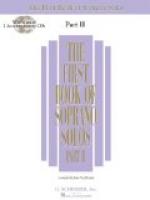“Yes, Father,” she said, “I do not think I can sing in the choir any longer. I saw very clearly yesterday that I had never been a true worshiper. I have never meant the words that I sang. I have scarcely thought about God while I sang words about Him or addressed to Him. Many of them I could not say honestly. It has all been for effect, and to—to please you all. So I—I concluded—I—couldn’t go on any longer.”
It had been a very difficult speech, and Winifred’s voice sank at the end.
Mr. Gray looked very grave.
“You surprise me, Winnie,” he said. “You surprise me very much. You should be conscientious, surely, but you will let me say I think you are taking the matter too seriously,”
Silent Hubert shot a reproachful glance at his father. In his estimation here was a case of downright honesty that called for applause, not repression.
“I think your father is right, Winifred,” said Mrs. Gray faintly, and then she added, rather illogically, “but I do not understand just what you mean.”
“Can I take the truth too seriously, Father?” asked Winifred, still speaking with an effort. It was an ingenuous question, but Robert Gray found it hard to answer.
“No,” he said, after a moment’s hesitation, “not truth itself, but we may get wrong ideas of it. But, Winnie,” he added, with real sorrow in his voice, “I hope you do not mean to tell us that you will not hereafter try to worship God, since the past has been so unsatisfactory to you?”
“Oh, no, Father,” said Winifred quickly, with rising courage as her experience of the night before came vividly to her. “I have more to tell. I was very unhappy about it all last night, and—I prayed—she blushed, for it was new to speak of such things—I prayed, and it came to me that there was a way to come to God just as I was, and He would make me a true worshiper; and I came.”
Winifred’s embarrassment could not quite cover her joy as she made her confession. The father looked relieved.
“I am thankful,—very thankful, Winnie,” he said. “You did nobly. That was quite right—quite right. But now I do not see that you need give up your singing, but that you might go on sincerely where you have failed before.”
He looked a little anxious, for her singing in the church was very dear to him.
Winifred’s brow clouded. “I fear I cannot, Father. Not now, at least.”
“No? Well, we’ll talk about it later,” he said kindly, and they left the breakfast table.
In the hall Hubert waited for Winifred with his own form of benediction:
“You’re a brick, Winnie,” he said, and planted a kiss upon her fair forehead.
She smiled and returned his kiss with an affectionate caress. Hubert’s slangy praise was dearer to her than any polished compliment from another source.
Hubert did not understand why he hated the world and things a little less as he walked to business that morning, the stone walk answering to his usual sharp, decisive step. He did not know that it was a gleam of something pure and true, of a religion not in word but in deed, that had flashed across his path and mitigated its darkness.




